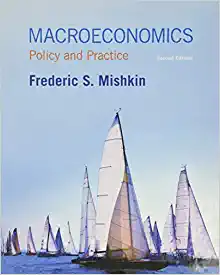Question
In your responses , comment on at least two of your peers' posts and share example of how non-rational human behavior can change an economic
In your responses, comment on at least two of your peers' posts and share example of how non-rational human behavior can change an economic outcome.
Behaviors that should be considered vary from the fact that people are confident. People are overconfident. Overconfidence bias is the tendency for a person to overestimate their abilities. It may lead a person to think they're better than what they are. This bias leads to bad decisions, both professionally and personally.
Another behavior is how society places value on the opinions of others over the research provided to them. As stated in the Cengage Ch. 22-3a, using the car purchase example vs. the friend's negative sentiment. They let one person's opinion cloud the research of a reputed research organization, such as Consumers Reports. But because it's your friend, you give their bad experience more clout than it deserves as an informed decision.
Third and most common, in my opinion, people are reluctant to change their minds once they have made it up. You can provide two people with opposing views on the same topic. Present with new verified evidence, and both will maintain their same stance.
These traits can work both ways. If I'm on the fence about choosing two evenly matched items, say two muscle cars, a Dodge Challenger, or a Chevy Camero. The opinion of a friend or known associate can sway your decision to make the right choice and choose the Dodge Challenger .
More often than not, negative opinions will change our minds and cause doubt in our logical research-based decisions.
People give too much weight to a small number of vivid observations. Imagine that you are thinking about buying a car of brand X. To learn about its reliability, you read Consumer Reports, which has surveyed owners of car X. Then you run into a friend who owns car X, and he tells you that his car is a lemon. How do you treat your friend's observation? If you reason, you will realize that he has only increased your sample size, providing little new information. But because your friend's story is so vivid, you may be tempted to give it more weight in your decision-making than you should.
People are reluctant to change their minds. People tend to interpret evidence to confirm beliefs they already hold. In one study, subjects were asked to read and evaluate a research report on whether capital punishment deters crime. After reading the report, those who initially favored the death penalty said they were more confident in their view, and those who initially opposed it also said they were more confident. The two groups interpreted the same evidence in precisely opposite ways. This behavior is sometimes called confirmation bias.
Congratulations to all of us who persevered and made it to the end of our Microeconomics course.
Step by Step Solution
There are 3 Steps involved in it
Step: 1

Get Instant Access to Expert-Tailored Solutions
See step-by-step solutions with expert insights and AI powered tools for academic success
Step: 2

Step: 3

Ace Your Homework with AI
Get the answers you need in no time with our AI-driven, step-by-step assistance
Get Started


